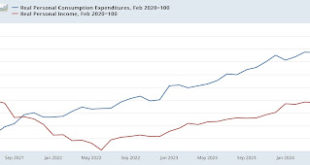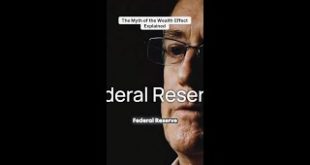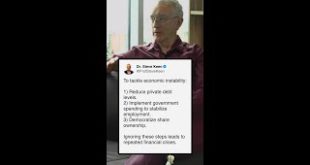Neoclassical economists ignore the instability of capitalism. This is a common belief. Many think capitalism is a stable system. They believe markets naturally find equilibrium. But this is fundamentally wrong. Hyman Minsky showed us that rising debt leads to economic crises. His insights reveal that debt accumulation creates instability. When debt rises, so does risk. The more we borrow, the more vulnerable we become. This isn't just theory; it's history. Look at the...
Read More »Blog Archives
Who said anything about a crash?
Stocks will follow the economy, and there is a slowdown happening, which will become more pronounced. 
Read More »The truth about immigration
The big lie about immigration, promoted by the GOP and its right-wing propaganda outlets, is that under Biden the US has had “open borders.” LOL! Nowhere close. And the US hasn’t had open borders at least since the Chinese Exclusion Act of 1882 that prohibited all immigration of Chinese laborers for ten years. The law remained in force until the passage of the Magnuson Act in 1943.So is immigration good or bad for America? In his new book, “The truth...
Read More »A Sweet-smelling Chemical Upended Life in Salinas, Puerto Rico
There are dangers involved in the manufacture of some medical supplies. Most companies will take adequate protection of the process to manufacture. At times the safety measures do become outdated as the manufacturing process changes due to new product. Then it becomes a matter of cost to improve safety measures. The article states ethylene oxide usage was in 2003. I believe I can vouch for its usage back to the mid-seventies. As the story...
Read More »Inflation Data Gives a ‘Bright Green Light’ for a Fed Rate Cut
We have been playing brinksmanship the last 30 days as to when it is a good time to reduce the Fed Rate taking your foot off the bake so to speak. If you read New Deal democrat’s latest report . . . “The monthly personal income and spending report is now the most important report of all, except for jobs. That’s because it tells us so much about the state of the consumer economy. In short, this was an excellent report (July personal income and...
Read More »Day 1 of the Courts Review of the FTC v Kroger
“FTC Previews Hard Evidence of Harms While Kroger and Albertsons Dangle Unenforceable Promises in Merger Hearing Opening Arguments,” Economic Liberties Kroger and Albertsons Dangle Unenforceable Promises in Merger Hearing Opening Arguments. Noteworthy in Day 1 of the hearing is Kroger uses Albertson’s pricing as the high mark to set its pricing between it and WalMart on the low end. It would seem such a combination of both stores would...
Read More »What if We were to Abolish the Super Rich?
Abolishing the Super Rich is a research piece, a book, and an opinion commentary by Tom Malleson. Associate professor Tom is at King’s University College at Canada’s Western University. Tom gives us a peek into his book entitled Against Inequality: The Practical and Ethical Case for Abolishing the Superrich (2023). The commentary/review of content reads nicely and the professor has his points in a row. Since we are an economics blog which touches...
Read More »July personal income and spending: an excellent report, with only one fly in the ointment
– by New Deal democrat The monthly personal income and spending report is now the most important report of all, except for jobs. That’s becuase it tells us so much about the state of the consumer economy. It is the raw material for several important coincident indicators that the NBER looks at, as well as several leading indicators on the spending side. To the numbers: in July nominal personal income rose 0.3%, and spending rose 0.5%. Since...
Read More »Wealth Effect: A Federal Reserve Myth.
Wealth Effect: A Federal Reserve Myth.
Read More »End Financial Crises Now.
To tackle economic instability, many believe that simply tightening regulations on banks and financial institutions will do the trick. This belief is fundamentally flawed. Regulations alone won't address the root cause of instability, which is excessive private debt. When people are drowning in debt, they can't spend. This leads to a vicious cycle of reduced consumption and economic stagnation. In fact, during the Great Depression, the more debtors paid, the more they owed. This...
Read More » Heterodox
Heterodox





